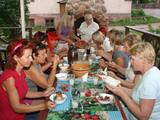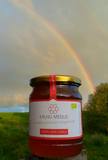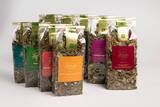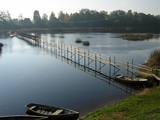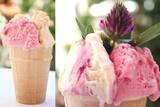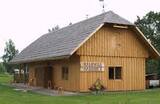| Нo | Название | Описание |
|---|---|---|
|
Корчма находится в центре столицы суитов Алсунге. Суиты всегда любили хорошо поработать, хорошо спеть и хорошо поесть! Хозяйки «Спелманю крогса» предлагают группам отведать приготовленные по старинным рецептам древних суитов блюда, а также всем вместе освоить приготовление скландраушей, клецок, скабпутры и других блюд этой стороны. Трапезу сделает незабываемой эффектное выступление женщин-суитов. Можете купить скландрауши и кислый хлеб, который пекут только у нас. Латышская кухня: Кисло-сладкий хлеб, клёцки, копченые рёбрышки. Особое блюдо: Домашние скландрауши. |
||
|
Одни из редко встречающихся берестоплетельщиков в Латвии предлагают осмотреть мастерскую, увидеть изготовленные из бересты предметы и делятся опытом. Каждый интересующийся при помощи мастеров может изготовить из бересты простые предметы, которые подойдут в качестве замечательных сувениров. |
||
|
В мастерской ремесленников делают славную, очень полезную и практичную утварь для бани - ушаты, шайки, запарники, ванны и ванночки, а также банные веники, льняные изделия и срубы для бани. Предлагают осмотреть мастерскую, принять участие в работе ремесленника, покупка и заказы на банные вещи. |
||
|
Посетители могут познакомиться с мастерской, понаблюдать за мастером во время работы, сделать сами, а также приобрести глиняные изделия (в т.ч. садовую керамику) и осмотреть красивый сад. |
||
|
Музей бани - это частный музей под открытым небом – простой и основательный. В настоящее время экспозиция музея состоит из шести старинных и одной новой бани. Все бани действующие. Музей находится в непрерывном развитии с момента его создания в 2008 году, и в планах на будущее - увеличение количества бань до двадцати - со всех уголков Латвии. |
||
|
Atrodas netālu no Biksēres muižas, blakus muižas parkam. Ozolkalna klēts saimniece Līga Kuba aušanas prasmes pirms pāris gadiem apguvusi Sarkaņu amatu skolā. Šeit radusies iecere par privātas aušanas darbnīcas izveidi, kas arī īstenota. Saimniece savas aušanas prasmes nodod jebkuram interesentam. Apmeklētāji var iegādāties šeit darinātos suvenīrus. |
||
|
Пчелиный пасека "Калну медус" находится на Видземской возвышенности, и в летний сезон можно отправиться на экскурсию по пасеке, продегустировать продукты пчеловодства, а также отправиться в тур по сбору чайных трав. |
||
|
Поля с лекарственными растениями сельского хозяйства «Курмиши» расположены в экологически чистом природном парке «Даугавас локи» и на территории охраняемой ландшафтной зоны «Аугшдаугава». Чтобы не уничтожить природные места произрастания лекарственных трав, уже с 1994 года на полях «Курмиши» выращиваются около 40 видов и сортов лекарственных растений. Энтузиастам выращивания лекарственных трав и туристам предлагается узнать секреты выращивания и приготовления лекарственных трав. После экскурсии имеется возможность попробовать и приобрести травяные чаи «Курмишу», которые наиболее вкусны с медом, собранных пчелами с растущих в хозяйстве лекарственных трав. Особую атмосферу создают свечи из пчелиного воска. В хозяйстве оборудованы места для отдыха, мастерская восковых свечей, можно приобрести сувениры из богатого предложения восковых поделок, посетить пчелиную пасеку. Хозяин предлагает также экскурсии по хозяйству в сопровождении гида. |
||
|
Один из участников общества Латвийского Фонда культуры «Школа гончаров» («Пуднику скула»), который использует старинные и проверенные веками методы гончарного дела Латгалии. Предлагает семинары, участие в открытии печи, возможность поработать самим, заказ и покупку керамических работ. |
||
|
In the farm "Ozoliņi" organic tea is produced. With brand "Lauku tējas" tea has been sold in stores more than 17 years. Hostess is happy to share her knowledge through seminars and tea workshops. The farm is surrounded by forests and biologically valuable meadows where you can find up to 50 plants per square meter. |
||
|
Одно из редких мест в мире, где по-прежнему в промышленном масштабе ловят миногу, используя старинный метод, которому более 150 лет – закол, т.е. через реку построены мостки с мережами. На Салаце таких три. В сопровождении местного рыбака можно увидеть процесс рыбной ловли, отведать и на месте приобрести жареную миногу. |
||
|
Музей хлеба, пекарня и гостевой дом, расположенные всего в 0,6 км от Аглонской базилики. Посетители могут проследить путь хлеба от зернышка до буханки, которую каждый может сделать сам. Предлагается дегустация хлеба (и травяные чаи) с театрализованным представлением на крестины, свадьбу, юбилей и др. На стол ставятся клёцки, крапивники, суп из сушеных грибов или уха из речной рыбы. В музее можно приобрести свежеиспеченный хлеб и работы местных ремесленников. Латышская кухня: Суп из озерной рыбы, клёцки и крапавники. Особое блюдо: Суп из сушеных грибов. |
||
|
Работы из глины обжигает в черной (окуривания) технике и работает с глиной, добытой в Латгалии. В процессе становления работ не использует индустриальные устройства, печь топит дровами. Демонстрирует формирование посуды на ножном гончарном круге и рассказывает о процессе обжига. Посетители могут поработать с глиной и купить работы. |
||
|
Ремесленник делает бочки, горячие бадейки, мебель, лестницы, двери и другие полезные в быту предметы. Проводит экскурсию, делится навыками своего ремесла и опытом, а также предлагает совместно сделать любую из полезных в хозяйстве вещей. Посетители могут наблюдать процесс изготовления бочки от начала до готового продукта, а также опробовать старинные орудия труда. |
||
|
Семейное предприятие (основано в 2006 году) из выращенных плодов и ягод выпускает домашнее мороженое. Производят как классическое - пломбир, сливочное, йогуртовое мороженое и сорбеты, так и чудеса современной кухни – мороженое с килькой, синим сыром, хреном и картофелем с томатным соусом. Разработано 80 всевозможных рецептов мороженого. По предварительной договоренности можно заказать экскурсию и узнать о приготовлении мороженого от самих поваров. В кафе можно отведать блюда из мороженого, причём каждое включает добавку с другим мороженым. В кафе с радостью встречают и четвероногих друзей! Особое блюдо: Мороженое из хрена с селедкой. |
||
|
Посетители могут принять участие в копчении рыбы (камбала, а также сарган и лещ), отведать продукцию и послушать рассказ о традициях прибрежного рыболовства. В «Кроги» представлено примерно 20 видов заборов побережья, характерных для Берега ливов. |
||
|
Выращивание и переработка чеснока, магазинчик деревенских продуктов. Рассказ о пользе чеснока для здоровья и о способах его применения в кулинарии. Предлагаются различные чесночные приправы, чаи, маринованные продукты, закуски, дегустация блюд с чесноком. Для детей ‒ рисование с помощью чеснока на ткани, игры с чесночной тематикой. |
||
|
В мастерской плотника предлагают особые экскурсии и мероприятия для взрослых и детей, разработаны тематические программы. Под руководством мастеров можно опробовать в работе традиционные деревообрабатывающие инструменты и освоить старинные игры, в заключение угоститься чаем, придающим силы, и устроить пикник в романтическом Доме костра. Можно купить деревянные сувениры и сделать заказы. |
||
|
Мельница построена в период с 1867-го по 1869-й год по типу голландского проекта. Свое название она получила благодаря фамилии первого хозяина – Риба. На мельнице, которая является одним из хорошо сохранившихся архитектурных памятников такого типа в Латвии, создана образовательная экспозиция «Путь зерна», рассказывающая о развитии сельского хозяйства в Земгале, традициях зерноводства и выпечке хлеба. Также предлагается экскурсия в сопровождении гида. Мельница является частью комплекса отдыха (гостиница, ресторан, мельница) «Рожмалас». |
||
|
В процессе выпечки хлеба «Лачи», популярного в Латвии и за ее пределами, применяют дошедшие с древних времен и сохраненные мастерами знания и умения. Здесь в дровяных печах пекут хлеб, используя только качественное сырье, натуральную закваску и опару. Ржаной хлеб выпекается из грубой и обдирной ржаной муки. Тесто бродит в деревянных квашнях и вымешивается вручную. За соблюдением традиций выпечки хлеба следят два мастера-пекаря и четверо подмастерьев.Здесь можно отправиться на экскурсию, сделать и выпечь буханку хлеба, подкрепиться в прекрасном кабачке и купить произведенную здесь продукцию. Латышская кухня: Крем-суп из боровиков, разные горячие блюда в горшочках, хлебный суп, «Десерт булочника». |
||
